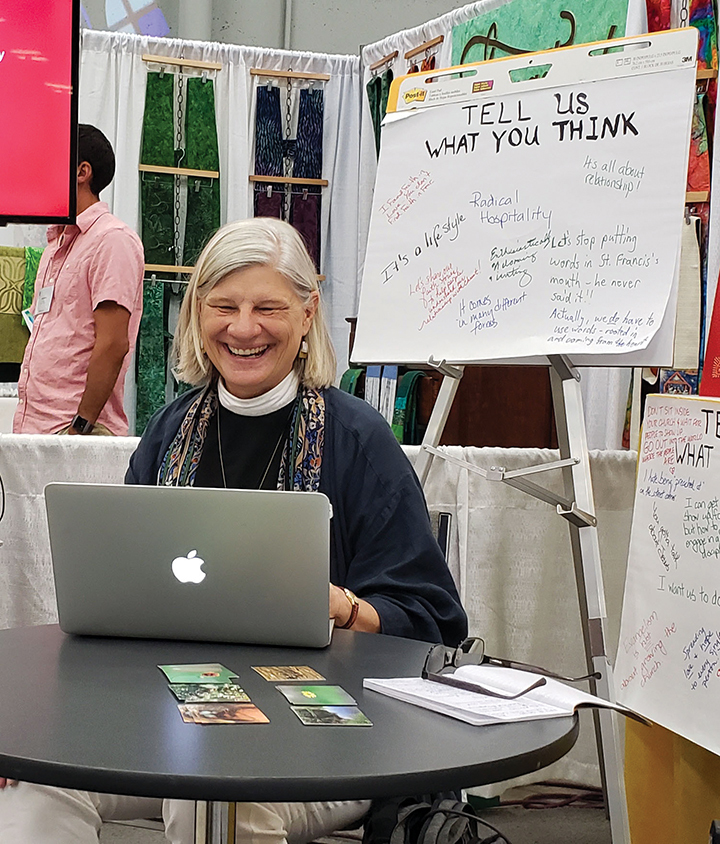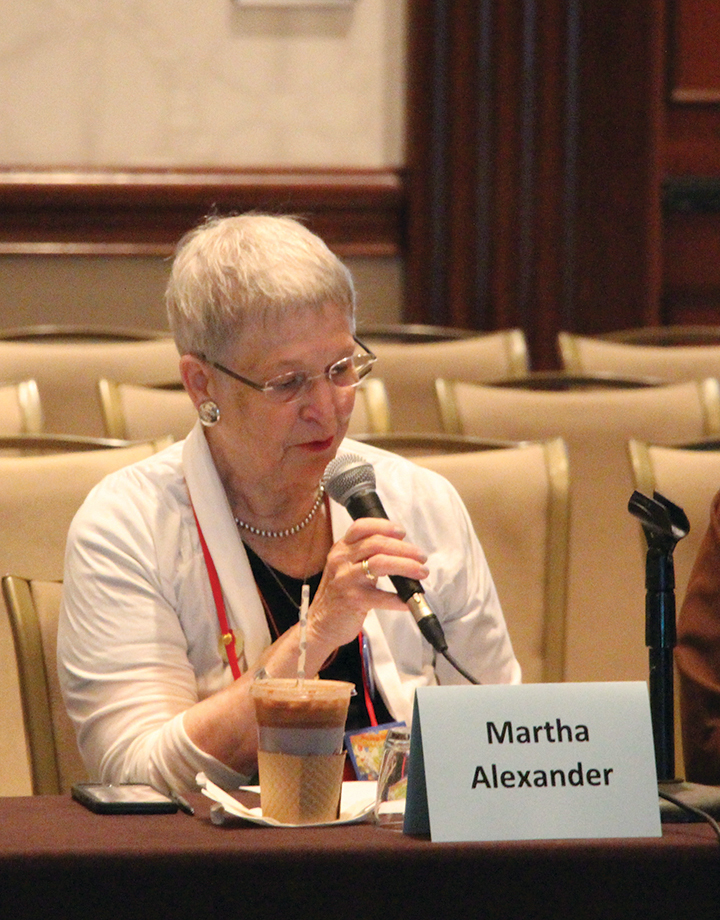Disciple: The 79th General Convention: North Carolina was all over it!

By the Rt. Rev. Anne Hodges-Copple
General Convention is reported to be one of the largest legislative bodies in the world, and it is certainly an enormous gathering of folks affiliated one way or another with The Episcopal Church. The number of bishops, deputies and alternates who served at the 79th General Convention in Austin, Texas, was close to 1,000. But they were not alone in the convention center. In addition to those conducting the business of General Convention, there were the Episcopal Church Women holding their triennial meeting, exhibitors, visitors, representatives from Episcopal institutions across the United States, honored dignitaries from around the Anglican Communion, Church staff and hundreds of volunteers. Add them together, and you have a gathering numbering in the thousands.
Even with such huge numbers, it was easy to spot laity and clergy from the Diocese of North Carolina making significant contributions in almost every arena. From the leadership platform during the four joint sessions of GC79, to the 23 legislative committees, to the exhibitors’ hall and the prayer chapel, North Carolina Episcopalians were everywhere.
The most visible example of our diocese’s passion for Spirit-filled mission is the preaching, teaching and leadership of the Presiding Bishop himself. The Most Rev. Michael Curry and the Executive Council have laid out three pillars of the Jesus Movement. If they sound familiar, it’s because our diocese has embraced and acted on these three priorities—evangelism, reconciliation and creation care—for years. In my five years as a bishop, I’ve heard from many quarters of the Church that the mission-minded spirit we call Going to Galilee—a biblical foundation for disciples who are transformed for mission in their local context—is seen as a pace-setter for the wider church.
It was this witness and leadership North Carolinians brought to General Convention.
As moderator of the TEConversations, three joint sessions of the Houses, the Rev. David Crabtree graciously and skillfully guided an enormous hall of mostly deputies and bishops through panel presentations and small-group discussions on evangelism, reconciliation and creation care. The Rev. Dr. Lauren Winner, author, historian, associate professor of spirituality at Duke Divinity School and vicar of St. Paul’s, Louisburg, was one of three presenters for the TEConversation on evangelism, describing it, in part, as a process that elicits curiosity about God and teaches disciples to cultivate “Jesus-adapted eyes” as a way of looking at the world as Jesus would, seeing brokenness as an invitation to healing.
 The Rev. Lisa Fischbeck, vicar of Church of the Advocate, Chapel Hill, conducted workshops about collaborative ministry, highlighting two Chapel Hill efforts: Pee Wee Homes and the Piedmont Patch Project. Both of these ventures combine elements of evangelism, reconciliation and care of creation, and both include community partners from within and outside of the Church.
The Rev. Lisa Fischbeck, vicar of Church of the Advocate, Chapel Hill, conducted workshops about collaborative ministry, highlighting two Chapel Hill efforts: Pee Wee Homes and the Piedmont Patch Project. Both of these ventures combine elements of evangelism, reconciliation and care of creation, and both include community partners from within and outside of the Church.
North Carolina deputies played key roles in some of the most pressing concerns and exciting moments of GC79. The Rev. Kevin Matthews served on the legislative subcommittee dealing with all the resolutions concerning marriage rites. Matthews and his fellow committee members helped navigate a via media for making rites of marriage available to all couples, gay and straight, in their home churches while also respecting the authority of individual bishops.
Deputy Athena Hahn was a member of the Standing Committee on Liturgy and Music this past triennium, at the center of three years of work bringing forward proposals relating to revising the Book of Common Prayer. In the end, GC79 adopted an approach that combines the best elements of several proposals. Stopping short of wholesale revision of the 1979 Book of Common Prayer, it opens up more possibilities for revised liturgies with more inclusive and expansive language for God and more attention to providing dynamic equivalency translations of our authorized liturgies into Spanish, French and Creole.
 Deputy Martha Alexander started her work long before General Convention as a member of a special task force for charting a successful process to welcome The Episcopal Church of Cuba back as a diocese. Martha’s skillful legislative acumen continued during GC79’s legislative process, allowing a successful outcome and tears and cheers of joy when at last the bishop and deputies of the Diocese of Cuba were seated in their respective Houses after a 50-year absence.
Deputy Martha Alexander started her work long before General Convention as a member of a special task force for charting a successful process to welcome The Episcopal Church of Cuba back as a diocese. Martha’s skillful legislative acumen continued during GC79’s legislative process, allowing a successful outcome and tears and cheers of joy when at last the bishop and deputies of the Diocese of Cuba were seated in their respective Houses after a 50-year absence.
Deputy Alice Freeman and I had our hands full on our parallel committees on Social Justice and United States Policy. I was chair of the Bishops Committee and Alice was a member of the Deputies Committee, though both always met together. Our joint work began weeks before GC79 to be ready to receive resolutions on topics with direct impact upon most of our communities: gun safety, opioid use and abuse, immigration, voter suppression, protection of families seeking asylum, the new sanctuary movement and protection for U.S. military personnel from arbitrary and capricious discharge. In the end, 23 of the 32 submitted resolutions were passed with amendments. The two resolutions submitted by the Diocese of North Carolina concerning immigration were ultimately absorbed into one of two larger resolutions on immigration: C033 and A178.
Alice and I will continue to work together in another capacity, as both of us were elected to the Executive Council of the Episcopal Church, which works as a whole as well as with the interim bodies appointed to carry out the work of the Church between General Conventions. Think of Executive Council as the Standing Committee and Diocesan Council rolled into one.
Watch: Bishop Anne Hodges-Copple and Alice Freeman Elected to Executive Council
The Rev. Dr. Helen Svoboda-Barber participated in a House of Deputies special task force on the status of women in the Church. Organized prior to convention to study and make recommendations addressing the continuing presence of discrimination against women in the Church, one of the outcomes of this work was Resolution DO16—Truth, Reconciliation and Restoration—which directs Executive Council to establish an interim body to continue this work.
The Rev. Dr. Jeanine Driscoll, vicar of St. Mark’s, Roxboro, helped design and guide the Liturgy of Listening that took place on July 4. She stayed on throughout General Convention as a member of the pastoral response team for those affected by the Liturgy of Listening.
And still there were more. More deputies putting in countless hours. More laity and clergy representing different interests and organizations throughout the Diocese. It seemed as though every time you walked a hall, an Episcopalian from the Diocese of North Carolina could be spotted, working, contributing, gathering information and building relationships for their work back home.
Watch: The Rev. Dr. Jeanine Driscoll Serves in Pastoral Role at 79th General Convention
Your bishops and deputies are returning with energy and ideas to continue our North Carolina work as the Episcopal Branch of the Jesus Movement. But as always, it will take all of us—as North Carolinians and as Episcopalians—working together to move it forward. But if North Carolina’s presence at the 79th General Convention is any indication of what we can do, we’re not only going to continue to be pace-setters for the wider church, we’re going to be picking up that pace.
The Rt. Rev. Anne Hodges-Copple is the bishop suffragan of the Diocese of North Carolina.
